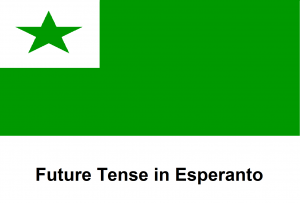Difference between revisions of "Language/Esperanto/Grammar/Future-Tense"
Jump to navigation
Jump to search
| (5 intermediate revisions by 4 users not shown) | |||
| Line 1: | Line 1: | ||
[[File:Future Tense in Esperanto.png|alt=Future Tense in Esperanto|thumb|Future Tense in Esperanto]] | |||
. | |||
*I will eat an egg - Mi manĝos ovon. | Hello everybody, | ||
In today's lesson you will learn some useful vocabulary about '''¨FUTURE TENSE¨''' in Esperanto. | |||
Feel free to edit this page by adding new words and expressions ! | |||
Happy learning ! :) | |||
When you have a solid handle on this material, you may be eager to discover these related topics: [[Language/Esperanto/Grammar/Gender|Gender]], [[Language/Esperanto/Grammar/Negation|Negation]], [[Language/Esperanto/Grammar/COMPARATIVES|COMPARATIVES]] & [[Language/Esperanto/Grammar/Past-Tense|Past Tense]]. | |||
== '''Some explanation for Future tense in Esperanto''' == | |||
'''<big>OBS.: In the infinitive form; change the last letter (-i) by (-os) to form the Future Tense</big>''' | |||
{| class="wikitable sortable" | |||
!<big>'''ENGLISH'''</big> | |||
!<big>'''PRONUNCIATION'''</big> | |||
'''<big>ENGLISH</big>''' | |||
!'''<big>ESPERANTO</big>''' | |||
|- | |||
|to have | |||
|'''''hah vih''''' | |||
|'''<big>havi</big>''' | |||
|- | |||
|I will have | |||
|'''''mih hah vohs''''' | |||
|'''<big>Mi havos</big>''' | |||
|- | |||
|You will have | |||
|'''''vih hah vohs''''' | |||
|'''<big>Vi havos</big>''' | |||
|- | |||
|He will have | |||
|'''''lih hah vohs''''' | |||
|'''<big>Li havos</big>''' | |||
|- | |||
|She will have | |||
|'''''shih hah vohs''''' | |||
|'''<big>Ŝi havos</big>''' | |||
|- | |||
|We will have | |||
|'''''nih hah vohs''''' | |||
|'''<big>Ni havos</big>''' | |||
|- | |||
|You will have | |||
|'''''vih hah vohs''''' | |||
|'''<big>Vi havos</big>''' | |||
|- | |||
|They will have | |||
|'''''ih lih hah vohs''''' | |||
|'''<big>Ili havos</big>''' | |||
|- | |||
| | |||
| | |||
| | |||
|- | |||
|I will come | |||
|'''''mih veh nohs''''' | |||
|'''<big>Mi venos</big>''' | |||
|- | |||
|I will eat an egg | |||
|'''''mih mahn johs oh vohn''''' | |||
|'''<big>Mi manĝos ovon</big>''' | |||
|} | |||
=== '''In Esperanto, expressing future tense is changing the "-i" (infinitive) of a verb to "-os".''' === | |||
*'''I will come. - Mi venos.''' | |||
*'''I will eat an egg - Mi manĝos ovon.''' | |||
==Other Lessons== | |||
* [[Language/Esperanto/Grammar/COMPARATIVES|COMPARATIVES]] | |||
* [[Language/Esperanto/Grammar/THE-NEGATIVE|THE NEGATIVE]] | |||
* [[Language/Esperanto/Grammar/Prefixe-MAL—-and-Suffixe-—IN|Prefixe MAL— and Suffixe —IN]] | |||
* [[Language/Esperanto/Grammar/Possessive-Case-in-Esperanto|Possessive Case in Esperanto]] | |||
* [[Language/Esperanto/Grammar/Interrogation|Interrogation]] | |||
* [[Language/Esperanto/Grammar/SUFFIXES|SUFFIXES]] | |||
* [[Language/Esperanto/Grammar/Prepositions|Prepositions]] | |||
* [[Language/Esperanto/Grammar/Past-Participle-in-Esperanto|Past Participle in Esperanto]] | |||
* [[Language/Esperanto/Grammar/Nouns|Nouns]] | |||
* [[Language/Esperanto/Grammar/PREPOSITIONS|PREPOSITIONS]] | |||
<span links></span> | |||
Latest revision as of 20:10, 26 March 2023
.
Hello everybody,
In today's lesson you will learn some useful vocabulary about ¨FUTURE TENSE¨ in Esperanto.
Feel free to edit this page by adding new words and expressions !
Happy learning ! :)
When you have a solid handle on this material, you may be eager to discover these related topics: Gender, Negation, COMPARATIVES & Past Tense.
Some explanation for Future tense in Esperanto[edit | edit source]
OBS.: In the infinitive form; change the last letter (-i) by (-os) to form the Future Tense
| ENGLISH | PRONUNCIATION
ENGLISH |
ESPERANTO |
|---|---|---|
| to have | hah vih | havi |
| I will have | mih hah vohs | Mi havos |
| You will have | vih hah vohs | Vi havos |
| He will have | lih hah vohs | Li havos |
| She will have | shih hah vohs | Ŝi havos |
| We will have | nih hah vohs | Ni havos |
| You will have | vih hah vohs | Vi havos |
| They will have | ih lih hah vohs | Ili havos |
| I will come | mih veh nohs | Mi venos |
| I will eat an egg | mih mahn johs oh vohn | Mi manĝos ovon |
In Esperanto, expressing future tense is changing the "-i" (infinitive) of a verb to "-os".[edit | edit source]
- I will come. - Mi venos.
- I will eat an egg - Mi manĝos ovon.
Other Lessons[edit | edit source]
- COMPARATIVES
- THE NEGATIVE
- Prefixe MAL— and Suffixe —IN
- Possessive Case in Esperanto
- Interrogation
- SUFFIXES
- Prepositions
- Past Participle in Esperanto
- Nouns
- PREPOSITIONS
